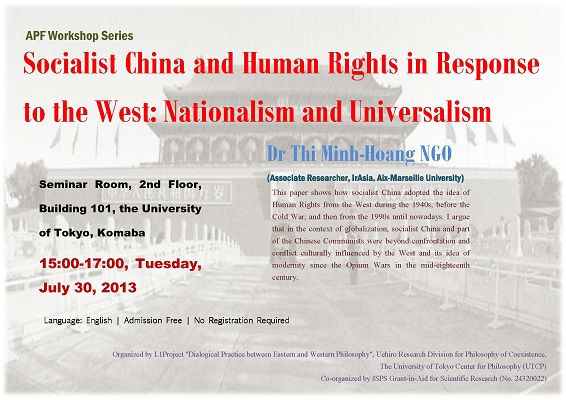
|
Title: | Socialist China and Human Rights in Response to the West: Universalism and Nationalism終了しました |
||
|---|---|---|---|---|
| Date: | 2013年7月30日(火) 15:00-17:00 |
Place: | 東京大学駒場キャンパス101号館2階研修室 |
|
Dr Thi Minh-Hoang NGO (Associate Researcher, IrAsia, Aix-Marseille University)
"Socialist China and Human Rights in Response to the West: Universalism and Nationalism"
Commentator: Dr Viren Murthy (Dept. History, University of Wisconsin-Madison)
Abstract:
This paper shows how socialist China adopted the idea of Human Rights from the West during the 1940s, before the Cold War, and then from the 1990s until nowadays. I argue that in the context of globalization, socialist China and part of the Chinese Communists were beyond confrontation and conflict culturally influenced by the West and its idea of modernity since the Opium Wars in the mid-eighteenth century.
Beyond confrontation and conflict, Modern Japan since the Meiji era in 1868 was for the Chinese Communists a model of Western modernity in East Asia and the channel through which the Western liberal ideas circulated and penetrated in China at the end of the nineteenth and the beginning of the twentieth century. The idea of Human Rights (renquan) spread among Chinese intellectuals from Japan and was translated from Japanese. The conceptualization of the idea of rights by Japanese philosophers such as Kato Hirohuki and Nakae Chômin was nevertheless interpreted both in China’s political and global context of political fragmentation and semi-colonization, with the aim to build a strong state confronting China and Japan.
Therefore, the rise of nationalism among the Chinese Communists turned the universal and Western idea of Human Rights as a moral value to a political strategy and tool in the process of the building of a strong state-nation during the period of the Second Japanese War (1937-1945) and from the 1990s until nowadays. Therefore, the CCP’s meaning of the universal idea of Human Rights has been different from the West and avoids to put the one-party and repressive system into question.
By nationalizing the idea of Human Rights without its universal value, the CCP’s aim has been to establish legitimacy of the state’s monopole of violence in Chinese society within the process of the making of the CCP’s political system. By the same time, from a global perspective, the CCP has been making endeavors to stand as a political superpower that can speak equally with the West on the question of Human Rights which has been encompassed within the “Chinese path” (zhongguo daolu). In fact, Human Rights has turned to politics in international relations, whether from the Western power’s or China’s side, as the problem of dissidents suggests.
From a long time perspective since the mid-nineteenth century, the question of Human Rights is a testimony both of Socialist China’s interaction with and confrontation to the West. It is also a testimony of both globalization and regionalization of Western ideas, with Japan serving as a channel that has led to think of modernity inspired from the West but different from it in Eastern Asia.
使用言語:英語|入場無料|事前登録不要
主催:東京大学大学院総合文化研究科・教養学部付属 共生のための国際哲学研究センター(UTCP) 上廣共生哲学寄付研究部門 L1プロジェクト「東西哲学の対話的実践」
共催:科研費基盤研究(B)「現代中国思想史構築のための中国知識界言説研究」







